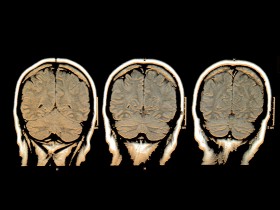 The mainstream media launched into a reefer mad frenzy this week after researchers from Harvard University in Boston and Northwestern University in Chicago published the results of a neuroimaging study assessing the brains of a small cohort of regular marijuana smokers and non-users. The brain scans identified various differences between the two groups in three aspects of brain morphometry: gray matter density, volume, and shape. These differences triggered dozens of high-profile media outlets to lose their collective minds. Here’s a sampling:
The mainstream media launched into a reefer mad frenzy this week after researchers from Harvard University in Boston and Northwestern University in Chicago published the results of a neuroimaging study assessing the brains of a small cohort of regular marijuana smokers and non-users. The brain scans identified various differences between the two groups in three aspects of brain morphometry: gray matter density, volume, and shape. These differences triggered dozens of high-profile media outlets to lose their collective minds. Here’s a sampling:
CNN: Casual marijuana use may damage your brain
Financial Post: Study proves occasional marijuana use is mind altering
Time: Recreational pot use harmful to young people’s brains
UK Telegraph: Smoking cannabis will change you. That’s not a ‘risk’, it’s a certainty
Yet despite the sensationalist headlines, the study itself was hardly newsworthy. Decades of research pertaining to the potential residual adverse effects of cannabis on brain cognition have failed to support the notion that marijuana poses any sort of permanent brain deficits. And as I write today on Alternet.org, this study similarly failed to report any sort of real-world adverse consequences associated with cannabis use:
Why the Media’s Fear-Mongering on Marijuana Effects on the Brain Is Faulty
via Alternet.org[excerpt] Using high–resolution MRI imaging, scientists identified specific changes in particular regions of the brain that they inferred were likely due to marijuana exposure. (Since researchers only performed a single MRI session, they could not say definitively whether these changes were, in fact, caused by cannabis or whether they existed prior to subjects’ use of the plant.) Notably, however, these changes did not appear to be associated with any overt adverse effects in subjects’ actual cognition or behavior. (Separate studies assessing youth use of legal intoxicants, such as nicotine and alcohol, have also been associated with documented changes in brain structure. Ditto for caffeine intake in preclinical models. These findings have received far less media attention.)
Both the cases (20 marijuana users) and controls (20 nonusers) in the study were recruited from local universities, undermining the notion that the alleged ‘brain damaged potheads’ were any more academically challenged than their non-using peers. Further, as summarized by HealthDay: “Psychiatric interviews revealed that the pot smokers did not meet criteria for drug dependence. For example, marijuana use did not interfere with their studies, work or other activities, and they had not needed to increase the amount they used to get the same high.”
In other words, case subjects and controls appeared to function similarly in their professional and academic endeavors.
You can read the full text of my response here.
Fortunately, my critique of this latest paper — and in particular the mainstream media’s sensationalist and erroneous coverage of its findings — is far from the only one. Below are links to several other excellent analyses:
MedPage Today: Striking a Nerve: Bungling the Cannabis Story
Daily Beast: No, Weed Won’t Rot Your Brain
Bits of DNA (blog): Does researching casual marijuana use cause brain abnormalities?
DPA Blog: Does Smoking Dope Really Make You a Dope?
Article republished from NORML









